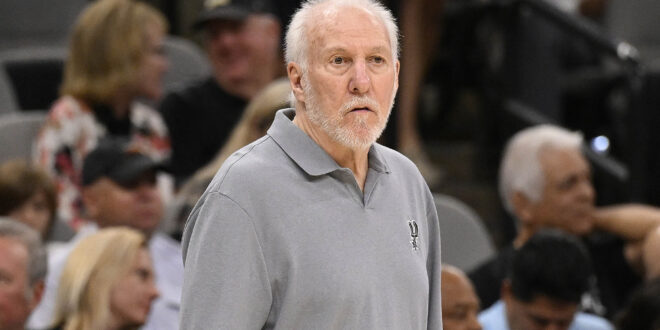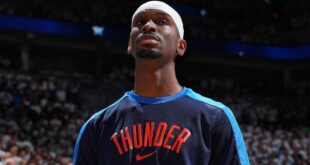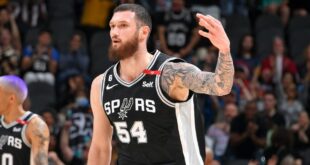On Friday, Gregg Popovich announced his resignation as the head coach of the San Antonio Spurs, concluding a remarkable 30-year era that celebrated his leadership in securing five NBA championships, becoming the league’s all-time winningest coach, and earning a place in the Basketball Hall of Fame.
“Though my dedication and enthusiasm for the game remain strong, I believe it’s time for me to step down from my role as head coach,” said Popovich.
He will now take on the position of team president. Assistant coach Mitch Johnson, who temporarily led the Spurs during the last 77 games of the season in Popovich’s absence, will assume the head coaching role.
📸 Transitioning from Coach to President of Basketball Operations
— San Antonio Spurs (@spurs) May 2, 2025
📸 Welcoming our new head coach Mitch Johnson!
— San Antonio Spurs (@spurs) May 2, 2025
At 76 years old, Popovich appeared in only five games this season after suffering a stroke at the team’s arena on November 2. While he has not publicly spoken since the incident, he did address his team on at least one occasion and shared a statement in late March expressing his desire to return to coaching, which will not occur.
“I am deeply thankful to the incredible players, coaches, staff, and fans who allowed me to lead them as the head coach of the Spurs. I look forward to continuing my support for this organization, the community, and the city that hold great significance to me,” Popovich remarked.
Popovich concludes his coaching career with a record of 1,422 wins and 869 losses, a total that includes the 77 games (with 32 wins and 45 losses) managed by Johnson this season. He also achieved 170 playoff victories with the Spurs, the highest total by any coach with a single team and the third-most in history, trailing only Phil Jackson’s 229 wins and Pat Riley’s 171.
“The greatest of all time,” said Spurs legend Manu Ginobili last year about Popovich.
Over his illustrious career, Popovich was a three-time NBA Coach of the Year, led Team USA to a gold medal at the Tokyo Olympics, and coached six Hall of Famers during his time in San Antonio: Ginobili, David Robinson, Tim Duncan, Tony Parker, Dominique Wilkins, and Pau Gasol. During his tenure, he faced 170 different coaches and witnessed 303 coaching changes within the NBA, including interim appointments.
“I have a priceless video on my phone,” shared Chris Paul, who played for the Spurs this past season and was drawn there in part due to the opportunity to work with Popovich. “It captures Pop doing ballhandling drills before a shootaround in Oklahoma City. All those years, I’d only seen him in a suit, but I was amazed by how hard he worked on the training floor.”
Paul noted that Popovich’s dedication extended into his rehabilitation process after the stroke. “As the first one to arrive at the arena for games, I would pass by the training room, and Pop would be on the treadmill. I witnessed his intense focus during rehab. That dedication had less to do with basketball and more to do with who he truly is.”
NBA Commissioner Adam Silver made a statement regarding Popovich today.
Popovich entered the role of general manager for the Spurs in December 1996, dismissing coach Bob Hill and promoting himself to head coach. At that time, the Spurs were struggling with a 3-15 record, having played all games without Robinson, who was about to return from an injury. His first game coincided with Robinson’s comeback.
“There was a need for a new direction,” Popovich stated back then.
Since that moment, the Spurs have not looked back.
“Coach Pop’s extraordinary influence on our family, San Antonio, the Spurs, and the sport of basketball is incredibly profound,” said Spurs managing partner Peter J. Holt. “His impressive accolades don’t truly reflect the impact he has made on countless individuals. He is truly one of a kind as a person, a leader, and a coach. Our family, along with fans globally, expresses gratitude for his remarkable 29-year coaching tenure with the Spurs.”
As Popovich’s storied career as a coach ends, fans reflect on his monumental 29 seasons with the team.
The Spurs’ fortunes shifted when Tim Duncan was selected first overall in the 1997 NBA Draft. However, Popovich’s steady leadership style has not wavered. The franchise’s first championship under his guidance came in 1999, with subsequent wins in 2003, 2005, 2007, and 2014. Throughout his first 22 seasons as head coach, the Spurs recorded winning records every year, achieving a minimum win rate of 60% for the first 20 of those seasons.
Popovich’s decision to resign comes at a time when the Spurs have just concluded their second year of a rebuilding phase centered around French phenom Victor Wembanyama, who arrives with expectations of greatness and has begun to deliver.
Having played basketball at the U.S. Air Force Academy, Popovich was famously overlooked for a spot on the 1972 U.S. Olympic team—a decision some still debate—before ultimately becoming a coach who initially might have been content coaching at Pomona-Pitzer, a California Division III program, throughout his career. He took charge of a struggling team that hadn’t won a conference game in 88 attempts and quickly turned them into champions.
Eventually, the NBA came calling. Over time, Popovich aligned himself with Robinson and subsequently built a dynasty with Duncan, Parker, and Ginobili at its core, crafting a career unparalleled in basketball history.
“Everyone recognizes his exceptional accomplishments, but I wish more could appreciate the kind of person he is,” remarked veteran coach Larry Brown in 2021.
Popovich was known for his gruff demeanor and often had clashes with reporters, rarely providing details about his basketball or personal life unless necessary. This facade often concealed a softer side; he was a quiet advocate for causes like the San Antonio Food Bank for many years and was not hesitant to express his political opinions. Those close to him often describe his humor as remarkable.
“He has such a great sense of humor,” recalled Boston forward Jayson Tatum, who played for Popovich during the Tokyo Olympics. “The casual fan sees him in those postgame interviews, but that’s not who he really is. Spending time with him is a joy.”
The heartbreak from losing a tightly contested 2013 NBA Finals left a lasting impact on Popovich. The Spurs were poised to clinch the championship against the Miami Heat in six games but lost in double overtime due to a crucial three-pointer from Ray Allen, ultimately falling in Game 7. However, after that game, Popovich joined Miami coach Erik Spoelstra in a celebratory embrace, wearing a wide grin.
“Thank you, Coach Pop, for your brilliance both on and off the court. We anticipate our next chapter with you,” said the Spurs on social media.
Spoelstra, who took over as the Heat’s coach in 2008, now holds the title of the longest-serving coach in the league.
“He has always exemplified class and integrity,” said Spoelstra of Popovich. “To conduct yourself with dignity, regardless of the game’s outcome, demonstrates that it’s possible to maintain class in both victory and defeat.”
When the Spurs defeated the Heat in a rematch for the title in 2014, it was Spoelstra who experienced the disappointment of loss. Once more, it was Popovich who extended his congratulations for a job well done.
“There’s no one else quite like Pop,” remarked Golden State coach Steve Kerr.
Popovich’s tenure as a coach was unparalleled. Over nearly three decades with the Spurs, he enjoyed a level of stability rarely seen in major professional sports in the United States. Other lengthy tenures include Connie Mack managing the Philadelphia Athletics for 50 years, George Halas coaching the Chicago Bears for 40 years, and John McGraw managing the New York Giants for 31 years— all of which have lasted more than half a century ago, unmatched until now.
“Simply put, it signifies I’m aging,” Popovich joked last year.
He also broke ground in the league by hiring Becky Hammon, the first-ever full-time female assistant coach. Hammon has gone on to become the head coach of the WNBA’s Las Vegas Aces and made history as the first female head coach during the NBA Summer League and as the first woman to take on head coaching responsibilities when she stepped in for Popovich in 2020.
“Basketball transcends gender,” stated South Carolina women’s coach Dawn Staley when approached about Popovich in 2017. “It’s all about intellect, approach, and commitment. If given the opportunity, women can thrive in this sport. As we see, Becky Hammon is doing great things. We need more leaders like Coach Popovich to provide opportunities for women to develop and flourish. He views people for their basketball acumen, not their gender.”
In conversations, Popovich often discussed wine and shared his views on societal issues, but he seldom revealed insights about coaching strategies or roster decisions, operating with a level of secrecy that resembled military precision. This was fitting, as he was a graduate of the U.S. Air Force Academy and was knowledgeable about complex historical topics, such as the rise and fall of the Soviet Union.
Moreover, his patriotism prompted him to take on a supplementary role during his time in San Antonio—coaching USA Basketball at the 2019 World Cup and the Tokyo Olympics two years later. While his World Cup squad finished seventh, marking the poor performance of a U.S. team comprised of NBA players, his Olympic team succeeded in bringing home the gold.
“Having attended the military, it’s impossible to disconnect it from the experience of coaching the national team,” Popovich shared when reflecting on his time at the Air Force Academy and his coaching duties. “I’ve had classmates who fought in battles—and some are no longer with us. This builds a deep appreciation for those who have made sacrifices. Thus, when presented with the chance to represent my country, it’s hard to say no. I cherish being part of it.”
 NBA News NBA News, Match Reports and Updates
NBA News NBA News, Match Reports and Updates



